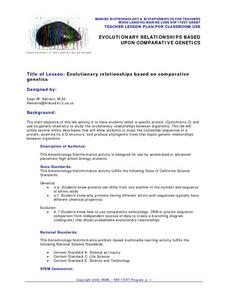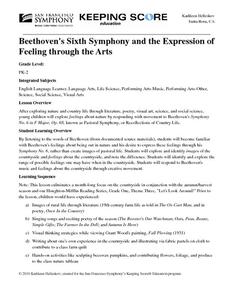Space Awareness
The Climate in Numbers and Graphs
Weather versus climate: weather relates to short time periods while climate averages the weather of a period of many years. Scholars learn about average temperature and precipitation in various climate zones and then apply statistics...
Space Awareness
Oceans on the Rise
Temperature rises and land disappears! Through a lab exploration, learners understand the effect of temperature increase on water similar to the effect of global warming on our oceans. As they heat the water in a flask, they measure the...
Space Awareness
Meet Our Neighbors: Sun
The sun isn't just a ball of yellow! Young scientists learn about the features of the sun using a hands-on modeling activity. They build models of the sun using common household items to represent sunspots, solar prominence, and the...
Curated OER
Signal Flags and Codes
Students make sets of nautical signal flags and use them to communicate in the classroom.
Curated OER
2nd Grade - Act. 25: Creature Creation
Create a creature using some of the characteristics of a real animal. Second graders will read a book from the "Froggy," series by Johnathan London to learn about the characteristics of frogs. After discussing and recording various...
Curated OER
Wetland Metaphors
Learners describe the characteristics of wetlands and identify their ecological functions. They inspect items and use them to create metaphors about wetlands.
Curated OER
Inquiry into Consumer Products
Students recognize different consumer products, found in and around the home, that have reactive or denaturing properties when used together. They explore chemical and physical properties of each product by identifying chemical formulas...
Curated OER
Vaccines
Students explore and explain the role of vaccines in infectious disease, They emphasize immunological principles and viral/bacterial infection processes. Students explore the three main vaccine types: DNA vaccines ("gene gun"),...
Curated OER
Does cloud type affect rainfall?
Student use MY NASA DATA to obtain precipitation and cloud type data. They create graphs of data within MY NASA DATA. Students compare different cloud types, compare precipitation, and cloud type data They qualitatively describe graphs...
Curated OER
Bursting Blooms- Create an Early Spring
Young scholars prune a tree. In this gardening lesson, students select a shrub or tree that has a lot of flower buds and use sharp pruners to cut sections of branches. Young scholars place the cuttings into cool water and...
Curated OER
Questions - Appearances are Deceiving
Five evolution-related questions are answered by beginning biologists on a separate sheet of paper. First, they are asked to list adaptations that allow organisms to survive under various conditions. The second question refers to...
Curated OER
Tour of the Cell 1
Each of these slides deals with an individual organelle and displays a diagram along with labels of the structures. The most useful components of this slideshow are the summaries of functions and descriptions of how the organelles are...
Curated OER
Structure and Function of the Cell/Introduction to the Cell
So, this is not technically a learning exercise, but rather a chapter of reading material, pictures, and diagrams introducing young biologists to the cell. Cell theory, diversity, size, and shape are described. The internal organization...
National Institute of Open Schooling
Occurrence and Extraction of Metals
Steel is a man-made alloy or a mixture of metals. Lesson 18 in this series of 36 focuses on metals and their extraction from Earth. Individuals read about, discuss, and answer questions after learning how people find most metals, the...
National Wildlife Federation
The Amazing Adventures of Carbon: How Carbon Cycles through the Earth
Here's a stat for your pupils: 18 percent of the human body is carbon! Part 10 in the series of 12 takes pairs on an adventure through the carbon cycle. After a class reading about carbon, pairs read and choose their own adventure...
Curated OER
The Chesapeake Bay in Captain John Smith's Time
When Captain John Smith visited the Chesapeake Bay in the summer of 1608, what types of animals and habitats did he encounter? Your young historians will analyze primary source documents to answer this question, as well as compare...
Curated OER
We All Live Together
First graders examine the lifestyle of classroom and family pets in their natural habitat. They determine the needs of plants and animals, and how those needs are met. They listen to read alouds, sing songs, and draw using computer based...
Curated OER
The Great Kapok Tree by Lynne Cherry
With The Great Kapok Tree, by Lynne Cherry as the hook learners discuss the rainforest, the animals that live there, and conservation efforts. Then, students write a letter to the man in the story asking him not to cut down the Kapok...
Curated OER
Evolutionary Relationships Based Upon Comparative Genetics
Students investigate the protein cytochrome c in an attempt to use its genetic chemistry to study possible evolutionary relationships between organisms. The lesson integrates technology with the use computers to perform DNA analysis.
Curated OER
Who is the Sea Otter Related to?
Students examine the genetic relationships of different organisms. In groups, they discover the importance of genes and how different amino acids show various evolutionary relationships. They use an online database to continue their...
Curated OER
Catalase: A Bioinformatics Case Study
Students investigate the physical structure of a protein by using a computer simulation tool. They record its primary amino acid structure while viewing it in three dimensions for a better visual recognition. There is also a comparison...
Curated OER
Tropical Forest Food Chain
Learners explore the interdependence of the animals and plants in tropical rainforests. They explore the importance of conserving biodiversity and tropical food chains. They create a tropical forest food chain and identify species that...
Curated OER
Ambassador Satch, Superb Entertainer: 1950-1971
Students participated in guided listening lessons of Louis Armstrong's jazz music while interpreting his lyrics. They study his life as an entertainer and goodwill ambassador for the US.
San Francisco Symphony
Beethoven's Sixth Symphony and the Expression of Feeling through the Arts
Here is an activity used originally to finish off a unit on country life and nature. It requires learners to have a basic understanding of harvest, rural life, and autumn. They'll use what they know to construct dance movements showing...























